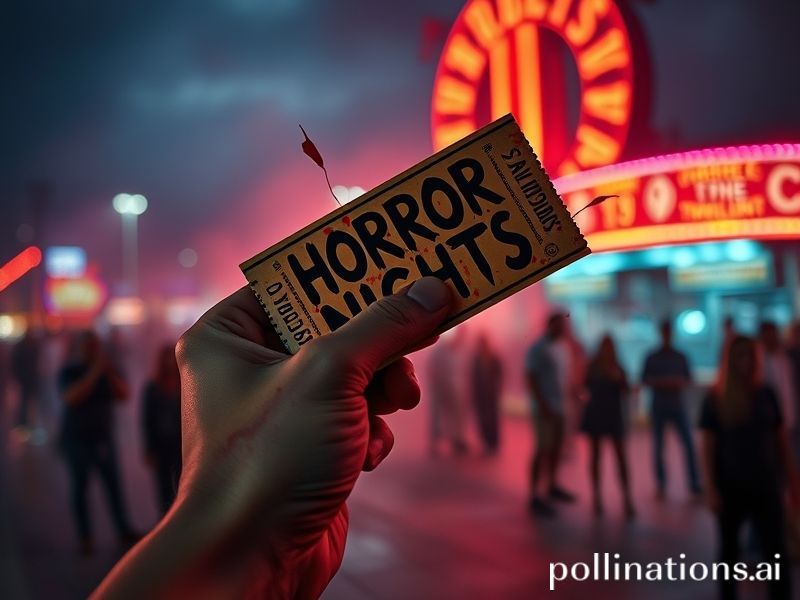Global Horror Nights Tickets: How the World Pays to Be Terrified in 2024
Horror Nights Tickets: The Global Scramble to Pay for the Privilege of Being Terrified
By D. Locke, Senior Correspondent & Professional Glutton for Punishment
If you want proof that the human race has officially run out of real problems to solve, consider this: horror-nights tickets—those overpriced wristbands that grant you entry to pop-up mazes where underpaid actors in latex chase you with chainsaws—are now traded like conflict diamonds on secondary markets from Singapore to São Paulo. In Manila, scalpers have been arrested for counterfeiting Universal Studios passes; in Dubai, a black-market broker was caught hawking “VIP no-line” lanyards for the price of a kidney on the grey market (actual kidneys still cheaper). Meanwhile, the European Central Bank quietly wonders whether fear-based consumer spending should be added to inflation calculations.
The phenomenon is no longer a quaint American tradition born in Orlando parking lots. Halloween Horror Nights, Fright Nights, Terror Fest, and their endless local rebrands have metastasized into a trans-national supply chain of screams. Mexico City’s “Noches de Miedo” imports Japanese onryō ghosts; Seoul’s “Ever-Haunt” flies in Romanian set designers; and, in a triumph of outsourcing, a warehouse outside Prague now mass-produces animatronic clowns for every continent except Antarctica, where penguins apparently have better taste. The logistics alone would make NATO jealous—though, to be fair, NATO never had to air-freight 40,000 gallons of fake blood while respecting IATA hazmat regulations.
Naturally, geopolitics has crept in. When China briefly banned “superstitious content” ahead of last year’s Party Congress, enterprising Shanghai teens simply VPN’d themselves to California servers, bought digital tickets, and livestreamed their virtual haunt experience back home. Beijing’s censors retaliated by pixelating the gore, which—ironically—made the zombies look even more terrifying, like Minecraft cosplayers with taxidermy hobbies. The episode proved, once again, that if you try to ban fear, capitalism will simply FedEx it overnight with tracking.
Global inequality shows up in curious ways. A single Fast Pass in Los Angeles equals the monthly minimum wage in Bogotá; meanwhile, in Zurich, hedge-fund analysts drop the equivalent of a Tesla down payment to rent a private “scare squad” who chase them through a rented alpine fortress. Somewhere in between, the middle classes swap Airbnb horror packages—because nothing says “authentic dread” like discovering your Prague flat is actually a decommissioned nuclear bunker with Wi-Fi slower than the Cold War.
Psychologists, ever eager to monetize existential dread, have labeled the craze “recreational adrenalization.” Translation: paying strangers to trigger the same fight-or-flight chemicals our ancestors felt while fleeing actual saber-toothed tigers. Only now we post it on TikTok with trending audio. The World Health Organization, not to be left out, warns that chronic jump scares may raise cortisol levels—then quietly advertises discounted therapy sessions in the same breath, proving that every crisis is just a vertical integration opportunity.
Environmentalists, bless their solar-powered hearts, point out that a single haunted house consumes as much electricity as a small village. In response, the industry has pledged to go “net-zero terror” by 2030, promising biodegradable entrails and solar-powered chainsaws that politely shut off at dusk. Whether this will offset the carbon footprint of 747s full of terrified Australians flying to Ohio for “authentic corn-maze trauma” remains an open question.
And yet, beneath the cynicism, the ticket lines reveal something almost touching: a species so collectively bored with comfort that it will queue for hours, passports in hand, just to feel something sharper than a push notification. In a world teetering between algorithmic sedation and actual apocalypse, maybe paying to scream in a fog-machine labyrinth is the sanest option left. After all, the real horrors—climate collapse, resurgent fascism, crypto—refuse to stay inside their designated scare zones.
So clutch your overpriced ticket, dear global citizen. That barcode is more than entry; it’s a receipt for the brief, curated illusion that terror can still be contained to a 45-minute maze with emergency exits. When the final chainsaw revs and the house lights snap on, you’ll shuffle back to the parking lot, ears ringing, wallet lighter, already doomscrolling for next year’s early-bird discount. Because nothing’s scarier than missing out—even on fear itself.







